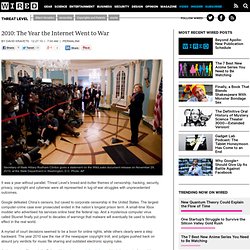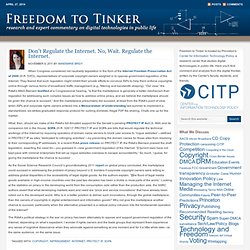

2010: The Year the Internet Went to War. Secretary of State Hillary Rodham Clinton gives a statement on the WikiLeaks document release on November 29, 2010, at the State Department in Washington, D.C.

Photo: AP It was a year without parallel. Don't Regulate the Internet. No, Wait. Regulate the Internet. When Congress considered net neutrality legislation in the form of the Internet Freedom Preservation Act of 2008 (H.R. 5353), representatives of corporate copyright owners weighed in to oppose government regulation of the Internet.

They feared that such regulation might inhibit their private efforts to convince ISPs to help them enforce copyrights online through various forms of broadband traffic management (e.g., filtering and bandwidth shaping). “Our view,” the RIAA’s Mitch Bainwol testified at a Congressional hearing, “is that the marketplace is generally a better mechanism than regulation for addressing such complex issues as how to address online piracy, and we believe the marketplace should be given the chance to succeed.”
What, then, should we make of the RIAA’s full-throated support for the Senate’s pending PROTECT IP Act (S. 968) and its companion bill in the House, SOPA (H.R. 3261)? The problem with nerd politics. In the aftermath of the Sopa fight, as top Eurocrats are declaring the imminent demise of Acta, as the Trans-Pacific Partnership begins to founder, as the German Pirate party takes seats in a third German regional election, it's worth taking stock of "nerd politics" and see where we've been and where we're headed.

Since the earliest days of the information wars, people who care about freedom and technology have struggled with two ideological traps: nerd determinism and nerd fatalism. Both are dangerously attractive to people who love technology. In "nerd determinism," technologists dismiss dangerous and stupid political, legal and regulatory proposals on the grounds that they are technologically infeasible. Geeks who care about privacy dismiss broad wiretapping laws, easy lawful interception standards, and other networked surveillance on the grounds that they themselves can evade this surveillance. The Hero the Internet Needs (YOU) by Alexis Ohanian.